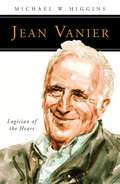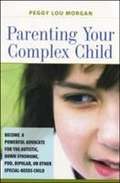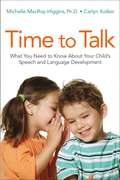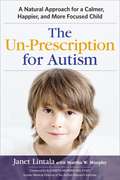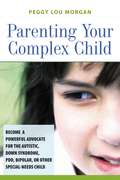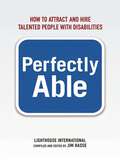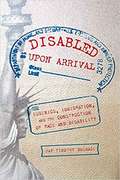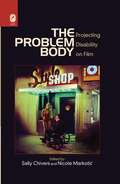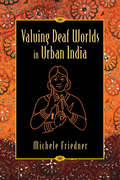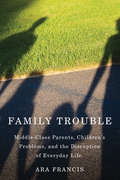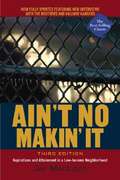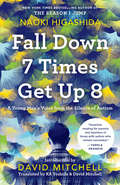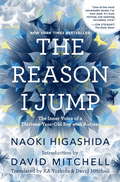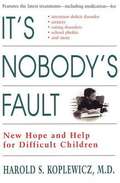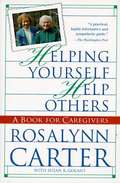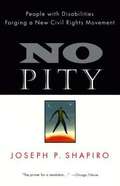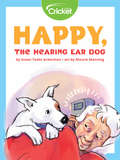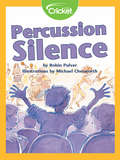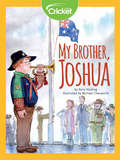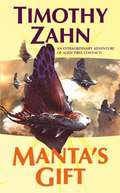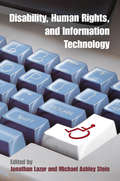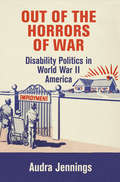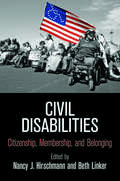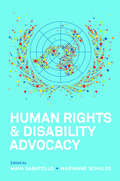- Table View
- List View
Jean Vanier: Logician of the Heart (People of God)
by Michael HigginsJean Vanier, Winner of the 2015 Templeton Prize and numerous other international and prestigious honors, Jean Vanier lives a radical poverty of surrender in a time of fanatical acquisitiveness, economic disparity, and mounting bellicosity among nations. He is a philosopher of the heart, icon of wholeness, and justice activist. Through such key notions as trust, community, relationship, and humility, Vanier has built up a network of service and nurturing growth spanning the globe: the L'Arche Movement. He has advocated for peace in a world that treasures its violence, written extensively about the very meaning of human personhood, and championed sensitivity to the diverse spiritual traditions that make up our world. His remarkable life has included rich friendships with Blessed Mother Teresa, St. John Paul II and Henri Nouwen. Jean Vanier is a man of complexity and formal philosophical training, a scion of a family of national pedigree, and one of the seminal religious and inspirational figures of our time. In this volume, Michael Higgins focuses on Vanier’s many interconnections—personal and conceptual—with the mighty and the humble, the pious and the secular, as well as the young and the seasoned.
Copious hosting: a theology of access for people with disabilities
by Jennie Weiss BlockDiscusses working with people with developmental disabilities in the Roman Catholic church
Parenting Your Complex Child: Become a Powerful Advocate for the Autistic, Down Syndrome, PDD, Bipolar, or Other Special Needs Child
by Peggy Lou MorganMorgan describes ways to parent children with special needs, particularly in communication, adaptation, and communicating with those who can help. She first recounts her experiences with her son, who is multiply disabled, then provides suggestions for working with doctors, tracking day-to-day behavior, schedules and routines, documentation, using service dogs, getting professionals to listen, creating a community, and hiring caregivers. The appendix consists of sample forms and lists. The book is aimed at parents of children with behavior disorders, developmental problems, autism, Down syndrome, bipolar disorder, schizophrenia, ADHD, pervasive development disorder, and others. There is no bibliography. Morgan has worked extensively with special-needs children and their families.
Time to Talk: What You Need to Know About Your Child's Speech and Language Development
by Carlyn Kolker Michelle Macroy-HigginsWondering when to expect baby’s first word? Want to get your toddler talking? Worried your child is not speaking as clearly as his peers?When it comes to language acquisition, all parents have questions…and Time to Talk has the answers. Written by an experienced speech-language pathologist and mom, this practical and proactive guide will help you:Understand the building blocks of speech and languageMonitor progress against expected milestonesEnhance your child’s communication skillsSpot signs of potential problems with hearing, speech, or language development Address common concerns, such as articulation, late talking, stuttering, dyslexia, and moreGet the best results from speech and language therapyFoster literacyRaise bilingual children successfullyAnd moreFrom baby’s first babbling to reading readiness, this speech-language booster and troubleshooter covers it all.
The Un-Prescription for Autism: A Natural Approach for a Calmer, Happier, and More Focused Child
by Janet LintalaEach year, more than 50,000 U. S. families receive an autism diagnosis. On top of turmoil and worry, they share the same urgent question: What can we do to help our child? The answers parents find can be contradictory. . . even dangerous. The conventional approach (employed by too many pediatricians) is to medicate difficult behaviors into submission--suppressing symptoms while leaving underlying health challenges untouched. Surfing the Internet for alternatives just leads to confusion. Now, Dr. Janet Lintala, founder of the Autism Health center and an autism mom herself, shares the natural protocols used in her practice to dramatically improve the function and well-being of children on the spectrum. Drawing on the latest research developments, as well as personal and clinical experience, she targets the underlying issues (chronic inflammation, oxidative stress, gastrointestinal dysfunction, immune dysregulation) associated with the behavior, bowel, and sleep problems so common to autism. Correcting these overlooked conditions with digestive enzymes, probiotics, antifungals, and other nonpsychiatric treatments brings transformative results: less pain, less aggression, and a child who is more receptive to behavioral and educational interventions. While the medical profession is slow to change, autistic kids need help immediately. The Un-Prescription for Autism provides clear explanations, detailed protocols, and examples to help parents act quickly to restore their child's health, self-control, and language--paving the way for reaching their full potential.
Parenting Your Complex Child: Become a Powerful Advocate for the Autistic, Down Syndrome, PDD, Bipolar, or Other Special-Needs Child
by Peggy MorganBesides the usual parenting challenges, parents of disabled children face added obstacles that can tax the resolve and resources of even the strongest families. Peggy Lou Morgan has developed a powerful system for obtaining dramatically better care for children with one or more serious disabilities. Parenting Your Complex Child reflects the experience and knowledge she has gained through decades of navigating a sea of complex medical, educational, occupational, and social issues while working with disabled clients and with her own son. Morgan's unique tracking and documentation tools let parents adapt to their child's challenges, create routines that support the child's needs, communicate those needs to busy professionals -- and be taken seriously by them. The book also helps parents lay the groundwork for care to continue after they themselves can no longer provide it. Compassionate, practical, and proven, Parenting Your Complex Child helps parents ensure that life-changing decisions are based on the best interests of the child -- and on the best information available.
Perfectly Able: How to Attract and Hire Talented People with Disabilities
by Jim HasseMore than 22 million of the almost 173 million working-age individuals in the United States have one or more disabilities. Perfectly Ableoffers practical guidance for companies large and small on how to hire and retain talented and motivated people from within this largely untapped pool of potential employees. Illustrated with enlightening personal stories, this one-of-a-kind book provides insight into what it's like to seek employment as an individual with a disability. Readers will discover how to: * Evaluate how suited their workplace environment is for disabled or different employees and what needs to be changed * Improve and sustain their workforce by hiring the best people, regardless of any disability or diversity issue * Effectively recruit, place, and develop individuals with disabilities who can contribute to their company's success * Embrace the differences among their workforce to add value to the organization
Disabled Upon Arrival: Eugenics, Immigration, And The Construction Of Race And Disability
by Jay Timothy DolmageIn North America, immigration has never been about immigration. That was true in the early twentieth century when anti-immigrant rhetoric led to draconian crackdowns on the movement of bodies, and it is true today as new measures seek to construct migrants as dangerous and undesirable. This premise forms the crux of Jay Timothy Dolmage’s new book Disabled Upon Arrival: Eugenics, Immigration, and the Construction of Race and Disability, a compelling examination of the spaces, technologies, and discourses of immigration restriction during the peak period of North American immigration in the early twentieth century. Through careful archival research and consideration of the larger ideologies of racialization and xenophobia, Disabled Upon Arrival links anti-immigration rhetoric to eugenics—the flawed “science” of controlling human population based on racist and ableist ideas about bodily values. Dolmage casts an enlightening perspective on immigration restriction, showing how eugenic ideas about the value of bodies have never really gone away and revealing how such ideas and attitudes continue to cast groups and individuals as disabled upon arrival.
The Problem Body: Projecting Disability on Film
by Sally Chivers Nicole MarkoticEditors Sally Chivers and Nicole Markotic bring together the work of eleven of the best disability scholars from the U.S., the U.K., Canada, and South Korea to explore a new approach to the study of film by concentrating on cinematic representations of what they term "the problem body." The book is a much-needed exploration of the projection of disability on film combined with a much-needed rethinking of hierarchies of difference. The editors turned to the existing corpus of disability theory with its impressive insights about the social and cultural mediation of disabled bodies. They then sought, from scholars at every stage of their careers, new ideas about how disabled bodies coexist with a range of other bodies (gendered, queered, racialized, classed, etc.). To call into question why certain bodies invite the label "problem" more frequently than other bodies, the contributors draw on scholarship from feminist, race, queer, cultural studies, disability, and film studies arenas. In Chivers and Markotic's introduction, they draw on disability theory and a range of cinematic examples to explain the term "problem body" in relation to its projection. In explorations of film noir, illness narratives, classical Hollywood film, and French film, the essays reveal the "problem body" as a multiplication of lived circumstances constructed both physically and socially.
Valuing Deaf Worlds in Urban India
by Michele Ilana FriednerAlthough it is commonly believed that deafness and disability limits a person in a variety of ways, Valuing Deaf Worlds in Urban India describes the two as a source of value in postcolonial India. Michele Friedner argues that the experiences of deaf people offer an important portrayal of contemporary self-making and sociality under new regimes of labor and economy in India. Friedner contends that deafness actually becomes a source of value for deaf Indians as they interact with nongovernmental organizations, with employers in the global information technology sector, and with the state. In contrast to previous political economic moments, deaf Indians increasingly depend less on the state for education and employment, and instead turn to novel and sometimes surprising spaces such as NGOs, multinational corporations, multilevel marketing businesses, and churches that attract deaf congregants. They also gravitate towards each other. Their social practices may be invisible to outsiders because neither the state nor their families have recognized Indian Sign Language as legitimate, but deaf Indians collectively learn sign language, which they use among themselves, and they also learn the importance of working within the structures of their communities to maximize their opportunities. Valuing Deaf Worlds in Urban India analyzes how diverse deaf people become oriented toward each other and disoriented from their families and other kinship networks. More broadly, this book explores how deafness, deaf sociality, and sign language relate to contemporary society.
Family Trouble
by Ara FrancisOur children mean the world to us. They are so central to our hopes and dreams that we will do almost anything to keep them healthy, happy, and safe. What happens, then, when a child has serious problems? In Family Trouble, a compelling portrait of upheaval in family life, sociologist Ara Francis tells the stories of middle-class men and women whose children face significant medical, psychological, and social challenges. Francis interviewed the mothers and fathers of children with such problems as depression, bi-polar disorder, autism, learning disabilities, drug addiction, alcoholism, fetal alcohol syndrome, and cerebral palsy. Children's problems, she finds, profoundly upset the foundations of parents' everyday lives, overturning taken-for-granted expectations, daily routines, and personal relationships. Indeed, these problems initiated a chain of disruption that moved through parents' lives in domino-like fashion, culminating in a crisis characterized by uncertainty, loneliness, guilt, grief, and anxiety. Francis looks at how mothers and fathers often differ in their interpretation of a child's condition, discusses the gendered nature of child rearing, and describes how parents struggle to find effective treatments and to successfully navigate medical and educational bureaucracies. But above all, Family Trouble examines how children's problems disrupt middle-class dreams of the "normal" family. It captures how children's problems "radiate" and spill over into other areas of parents' lives, wreaking havoc even on their identities, leading them to reevaluate deeply held assumptions about their own sense of self and what it means to achieve the good life. Engagingly written, Family Trouble offers insight to professionals and solace to parents. The book offers a clear message to anyone in the throes of family trouble: you are in good company, and you are not as different as you might feel...
Ain't No Makin' It: Aspirations and Attainment in a Low-income Neighborhood
by Jay MacleodThis classic text addresses one of the most important issues in modern social theory and policy: how social inequality is reproduced from one generation to the next.
Fall Down 7 Times Get Up 8: A Young Man's Voice from the Silence of Autism
by David Mitchell Naoki Higashida Ka YoshidaFrom the author of the bestselling The Reason I Jump, an extraordinary self-portrait of life as a young adult with autism Naoki Higashida was only thirteen when he wrote The Reason I Jump, a revelatory account of autism from the inside by a nonverbal Japanese child, which became an international success. Now he shares his thoughts and experiences as a twenty-four-year-old man living each day with severe autism. In short, powerful chapters, Higashida explores school memories, family relationships, the exhilaration of travel, and the difficulties of speech. He also allows readers to experience profound moments we take for granted, like the thought-steps necessary for him to register that it’s raining outside. Acutely aware of how strange his behavior can appear to others, he aims throughout to foster a better understanding of autism and to encourage society to see people with disabilities as people, not as problems. With an introduction by bestselling novelist David Mitchell, Fall Down 7 Times Get Up 8 also includes a dreamlike short story Higashida wrote especially for this edition. Both moving and of practical use, this book opens a window into the mind of an inspiring young man who meets every challenge with tenacity and good humor. However often he falls down, he always gets back up.Advance praise for Fall Down 7 Times Get Up 8“Vibrant . . . In Mitchell and Yoshida’s deft translation, Higashida conveys this isolating mindset and his yearnings for connection and self-expression, in direct, evocative prose—his compulsive, restless motion, he writes, is ‘instinctual, like a wild animal running over a wide plain’—that provides readers with a window into a previously unknowable world.”—Publishers Weekly “Illuminating . . . Autism is a mysterious neurological condition. . . . Higashida gives us a thoughtful view of the art of living well in its shadow.”—Kirkus Reviews “Readers will find this older Higashida not only eloquent and thoughtful, but also wise, measured and, most of all, kind.”—BookPage“This book is essential reading for parents and teachers of those with autism who remain nonverbal.”—Temple Grandin, author of The Autistic Brain and Thinking in Pictures“Compelling insight on every single page, gently challenging assumptions you didn’t even know you held on how others ‘should’ process the social and physical environments around us.”—Ellen Notbohm, author of Ten Things Every Child with Autism Wishes You Knew
The Reason I Jump: The Inner Voice Of A Thirteen-year-old Boy With Autism
by David Mitchell Naoki Higashida Ka YoshidaYou've never read a book like The Reason I Jump. Written by Naoki Higashida, a very smart, very self-aware, and very charming thirteen-year-old boy with autism, it is a one-of-a-kind memoir that demonstrates how an autistic mind thinks, feels, perceives, and responds in ways few of us can imagine. Parents and family members who never thought they could get inside the head of their autistic loved one at last have a way to break through to the curious, subtle, and complex life within. <p><p> Using an alphabet grid to painstakingly construct words, sentences, and thoughts that he is unable to speak out loud, Naoki answers even the most delicate questions that people want to know. Questions such as: "Why do people with autism talk so loudly and weirdly?" "Why do you line up your toy cars and blocks?" "Why don't you make eye contact when you're talking?" and "What's the reason you jump?" (Naoki's answer: "When I'm jumping, it's as if my feelings are going upward to the sky.") With disarming honesty and a generous heart, Naoki shares his unique point of view on not only autism but life itself. His insights--into the mystery of words, the wonders of laughter, and the elusiveness of memory--are so startling, so strange, and so powerful that you will never look at the world the same way again. <p> In his introduction, bestselling novelist David Mitchell writes that Naoki's words allowed him to feel, for the first time, as if his own autistic child was explaining what was happening in his mind. "It is no exaggeration to say that The Reason I Jump allowed me to round a corner in our relationship." This translation was a labor of love by David and his wife, KA Yoshida, so they'd be able to share that feeling with friends, the wider autism community, and beyond. Naoki's book, in its beauty, truthfulness, and simplicity, is a gift to be shared.
It's Nobody's Fault: New Hope and Help for Difficult Children and Their Parents
by Harold S. KoplewiczA guide for parents of troubled children provides compassionate advice on the diagnosis, treatment, and prognosis for thirteen psychological disorders, including ADD, depression, and anxiety, dispelling myths about medication and other available treatments.
Helping Yourself Help Others: A Book for Caregivers
by Rosalynn Carter Susan K. GolantHaving cared at home for her ailing father and grandfather, Rosalynn Carter's involvement has taught her that Americans are in the middle of a caregiving crisis. In this book, Mrs. Carter addresses the social issues that have created this crisis and offers practical solutions to the problems caregivers typically experience, such as isolation, burnout, anger, and helplessness.
No Pity: People with Disabilities Forging a New Civil Rights Movement
by Joseph P. ShapiroPeople with disabilities forging the newest and last human rights movement of the century.
Happy, the Hearing Ear Dog
by Susan Yoder AckermanTyler's grandma is deaf, so she gets Happy, a specially trained dog who hears for her.
Percussion Silence
by Robin PulverZack's brother has special needs and meets weekly with a music therapist. When the family attends a percussion concert, Zack is concerned that Danny will embarrass him in front of the entire audience.
My Brother, Joshua
by Nola HoskingAlex wants his brother Josh to play bugle in a patriotic ceremony at a school, but Alex's brother has Down syndrome. Will he be able to?
Manta's Gift
by Timothy ZahnI am not a fan of science fiction, but I have to admit that this is a clever, creative and well-crafted novel. My favorite review: What if James Dean were a twin-tailed manta ray swimming in Jupiter's atmosphere? Bestselling Star Wars novelist Zahn (Angelmass) gives us a tale of teen coming-of-age angst set in the herd society of the Qanska, intelligent herbivores who inhabit the equatorial band of the gas giant. Suspecting them to be non-native life, Earth's corporate masters, the Five Hundred, send in a spy to find their hidden star drive. Facing their own disaster, the Qanska agree, hoping to gain a human perspective on the impending exhaustion of their ecology. What neither side can count on is how the person injected into the Qanskan world will react. Matt Raimey, a 22-year-old paralyzed by a skiing accident, agrees to have his brain transplanted into a Qanska fetus. Given a second chance to be mobile, he also unexpectedly gets another chance to mature. Zahn concentrates more on the psychological processes at work than on the technological. Solutions to problems arise from better emotional and intellectual integrity, not simply larger databases. While the author doesn't get as deep into his characters as they do into Jupiter's depths, his portrayal of Matt/Manta is direct and involving. Qanskan life, looking much like marine reef life on Earth, is intriguingly portrayed, even if the biology of the Qanskan problem is suspect. YA readers looking for more than the usual SF action-adventure should be well pleased. (Publisher's Weekly)
Disability, Human Rights, and Information Technology
by Jonathan Lazar Michael SteinDisability, Human Rights, and Information Technology addresses the global issue of equal access to information and communications technology (ICT) by persons with disabilities. The right to access the same digital content at the same time and at the same cost as people without disabilities is implicit in several human rights instruments and is featured prominently in Articles 9 and 21 of the Convention on the Rights of Persons with Disabilities. <P><P>The right to access ICT, moreover, invokes complementary civil and human rights issues: freedom of expression; freedom to information; political participation; civic engagement; inclusive education; the right to access the highest level of scientific and technological information; and participation in social and cultural opportunities. <P><P>Despite the ready availability and minimal cost of technology to enable people with disabilities to access ICT on an equal footing as consumers without disabilities, prevailing practice around the globe continues to result in their exclusion. Questions and complexities may also arise where technologies advance ahead of existing laws and policies, where legal norms are established but not yet implemented, or where legal rights are defined but clear technical implementations are not yet established. <P><P>At the intersection of human-computer interaction, disability rights, civil rights, human rights, international development, and public policy, the volume's contributors examine crucial yet underexplored areas, including technology access for people with cognitive impairments, public financing of information technology, accessibility and e-learning, and human rights and social inclusion. <P><P>Contributors: John Bertot, Peter Blanck, Judy Brewer, Joyram Chakraborty, Tim Elder, Jim Fruchterman, G. Anthony Giannoumis, Paul Jaeger, Sanjay Jain, Deborah Kaplan, Raja Kushalnagar, Jonathan Lazar, Fredric I. Lederer, Janet E. Lord, Ravi Malhotra, Jorge Manhique, Mirriam Nthenge, Joyojeet Pal, Megan A. Rusciano, David Sloan, Michael Ashley Stein, Brian Wentz, Marco Winckler, Mary J. Ziegler.
Out of the Horrors of War: Disability Politics in World War II America (Politics and Culture in Modern America)
by Audra JenningsFrom workplace accidents to polio epidemics and new waves of immigration to the returning veterans of World War II, the first half of the twentieth century brought the issue of disability—what it was, what it meant, and how to address it—into national focus. Out of the Horrors of War: Disability Politics in World War II America explores the history of disability activism, concentrating on the American Federation of the Physically Handicapped (AFPH), a national, cross-disability organization founded during World War II to address federal disability policy. Unlike earlier disability groups, which had been organized around specific disabilities or shared military experience, AFPH brought thousands of disabled citizens and veterans into the national political arena, demanding equal access to economic security and full citizenship. At its core, the AFPH legislative campaign pushed the federal government to move disabled citizens from the margins to the center of the welfare state.Through extensive archival research, Audra Jennings examines the history of AFPH and its enduring legacy in the disability rights movement. Counter to most narratives that place the inception of disability activism in the 1970s, Jennings argues that the disability rights movement is firmly rooted in the politics of World War II. In the years immediately following the war, leaders in AFPH worked with organized labor movements to advocate for an ambitious political agenda, including employer education campaigns, a federal pension program, improved access to healthcare and education, and an affirmative action program for disabled workers. Out of the Horrors of War extends the arc of the disability rights movement into the 1940s and traces how its terms of inclusion influenced the movement for decades after, leading up to the Americans with Disabilities Act of 1990.
Civil Disabilities: Citizenship, Membership, and Belonging (Democracy, Citizenship, and Constitutionalism)
by Nancy J. Hirschmann Beth LinkerAn estimated one billion people around the globe live with a disability; this number grows exponentially when family members, friends, and care providers are included. Various countries and international organizations have attempted to guard against discrimination and secure basic human rights for those whose lives are affected by disability. Yet despite such attempts many disabled persons in the United States and throughout the world still face exclusion from full citizenship and membership in their respective societies. They are regularly denied employment, housing, health care, access to buildings, and the right to move freely in public spaces. At base, such discrimination reflects a tacit yet pervasive assumption that disabled persons do not belong in society.Civil Disabilities challenges such norms and practices, urging a reconceptualization of disability and citizenship to secure a rightful place for disabled persons in society. Essays from leading scholars in a diversity of fields offer critical perspectives on current citizenship studies, which still largely assume an ableist world. Placing historians in conversation with anthropologists, sociologists with literary critics, and musicologists with political scientists, this interdisciplinary volume presents a compelling case for reimagining citizenship that is more consistent, inclusive, and just, in both theory and practice. By placing disability front and center in academic and civic discourse, Civil Disabilities tests the very notion of citizenship and transforms our understanding of disability and belonging.Contributors: Emily Abel, Douglas C. Baynton, Susan Burch, Allison C. Carey, Faye Ginsburg, Nancy J. Hirschmann, Hannah Joyner, Catherine Kudlick, Beth Linker, Alex Lubet, Rayna Rapp, Susan Schweik, Tobin Siebers, Lorella Terzi.
Human Rights and Disability Advocacy (Pennsylvania Studies in Human Rights)
by Maya Sabatello Marianne SchulzeThe United Nations adoption of the Convention on the Rights of Persons with Disabilities (CRPD) constituted a paradigm shift in attitudes and approaches to disability rights, marking the first time in law-making history that persons with disabilities participated as civil society representatives and contributed to the drafting of an international treaty. On the way, they brought a new kind of diplomacy forward: empowering nongovernmental stakeholders, including persons with disabilities, within human rights discourse. This landmark treaty provides an opportunity to consider what it means to involve members of a global civil society in UN-level negotiations.Human Rights and Disability Advocacy brings together perspectives from individual representatives of the Disabled People's Organizations (DPOs), nongovernmental organizations (NGOs), indigenous peoples' organizations, states, and national institutions that played leading roles in the Convention's drafting process. The contributors provide vivid and personal accounts of the paths to victory, including stumbling blocks—not all of which were overcome—and offer a unique look into the politics of civil society organizations both from within and in its interaction with governments. Each essay describes the nonnegotiable key issues for which they advocated; the extent of success in reaching their goals; and insights into the limitations they faced. Through the plurality of voices and insider perspectives, Human Rights and Disability Advocacy presents fresh perspectives on the shift toward a new diplomacy and explores the implication of this model for human rights advocacy more generally.Contributors: Andrew Byrnes, Heidi Forrest, Phillip French, Lex Grandia, Huhana Hickey, Markku Jokinen, Liisa Kauppinen, Mi Yeon Kim, Gerison Lansdown, Connie Laurin-Bowie, Tirza Leibowitz, Don MacKay, Anna MacQuarrie, Ronald C. McCallum AO, Tara J. Melish, Pamela Molina Toledo, Maya Sabatello, Marianne Schulze, Belinda Shaw.
